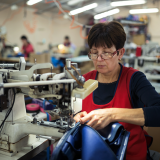EU context
Evropski steber socialnih pravic določa zaveze EU glede plač: pravico delavcev do pravičnih plač, ki zagotavljajo dostojen življenjski standard, zagotavljanje primerne minimalne plače ter preprečevanje revščine zaposlenih.
Delo Eurofounda
Eurofound redno poroča o različnih vidikih plač in dohodkov glede na spreminjajoče se gospodarske razmere v Evropi.
Spremljanje plač
Eurofound prek Evropske opazovalnice delovnega življenja (EurWORK) zbira različne informacije o plačah. Redno poročanje zagotavlja obsežnejše ugotovitve o plačah, določenih s kolektivnimi pogodbami, kar omogoča spremljanje trendov. Eurofound redno objavlja aktualne informacije o zakonsko določenih minimalnih plačah in plačah, določenih s kolektivnimi pogodbami. Poleg tega spremlja razvoj na nacionalni ravni v zvezi z mehanizmi določanja plač, enakim plačilom, variabilnim delom plače, nizkimi plačami in razlikami v plačilu med spoloma.
Profili držav glede delovnega življenja vsebujejo informacije o plačah na nacionalni ravni in se redno posodabljajo. EurWORK vzdržuje dve zbirki podatkov o plačah (glej vire v nadaljevanju).
Eurofoundov evropski center za spremljanje delovnih mest (EJM) ocenjuje spremembe v zaposlovanju po delovnih mestih v skladu z različnimi kvalitativnimi ukrepi, vključno s plačo. Zlasti prispeva k našemu poznavanju pojava polarizacije zaposlovanja – obseg, v katerem bo rast zaposlovanja verjetno večja na vrhu in dnu porazdelitve plač kot na sredini.
Podatki iz raziskave
V okviru Eurofoundovih raziskav se spremljajo tudi plačilni pogoji v EU. Plače so v središču Eurofoundovih raziskav pri ocenjevanju kakovosti delovnih mest. V evropski raziskavi o delovnih razmerah (EWCS) so plače eden od sedmih kazalnikov kakovosti delovnih mest. V raziskavi je omenjena tudi razlika v plačilu med spoloma. Spoznajte interaktivno orodje za ponazoritev podatkov iz raziskav EWCS.
V okviru evropske raziskave o kakovosti življenja (EQLS) se spremljajo vpliv dohodka na življenjske standarde in povezave med neenakostjo dohodkov ter socialno kohezijo in dobrim počutjem. Analizira vpliv krize na družine, pri čemer se upoštevajo družine z nizkimi dohodki, zadolženost gospodinjstev in skupine, ki jim grozi revščina. V okviru raziskave EQLS se zbirajo tudi informacije o dohodkih v pokoju in možnostih za podaljšanje delovne dobe. Spoznajte interaktivno orodje za ponazoritev podatkov iz raziskav EQLS.
V evropski raziskavi podjetij (ECS) sta zajeta uporaba sistemov variabilnega dela plač v organizacijah in vključenost zaposlenih v take organizacije na podlagi kolektivnih pogodb o plačah. Raziskava omogoča povezavo informacij o variabilnem delu plač in pogajanjih o plačah z informacijami o organizaciji dela, upravljanju človeških virov, neposredni udeležbi zaposlenih in socialnem dialogu, pa tudi z uspešnostjo in dobrim počutjem na delovnem mestu.

































